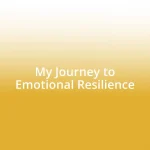Key takeaways:
- Recognizing triggers and understanding emotions related to habits is essential for making meaningful changes in one’s routine.
- Setting realistic, SMART goals and breaking them into smaller, manageable parts can sustain motivation and success.
- Building a support system, both personally and through online communities, enhances accountability and motivation in the health journey.
- Tracking progress and celebrating small victories reinforces commitment and acknowledges the effort behind achievements.

Understanding your current habits
Understanding your habits requires a moment of honesty. I remember sitting with a cup of coffee in hand, reflecting on my daily choices. It hit me then—are my habits serving me, or am I just on autopilot? These questions sparked an essential turning point in my journey.
Think about the small routines that fill your day—whether it’s scrolling through your phone first thing in the morning or mindlessly snacking in the evening. I often caught myself reaching for chips without even realizing it, which was not only unhealthy but also a sign of stress or boredom. Recognizing these triggers is the first step toward meaningful change.
What if we approached our habits with curiosity instead of judgment? I found that when I began observing my behaviors without criticism, I could dig deeper into why I did what I did. Each insight revealed layers of my emotions, helping me understand my relationship with food, exercise, and even downtime. Embracing this understanding can lead to transformation—because once you really know your habits, you can start reshaping them.

Identifying triggers and motivation
Identifying my triggers has been a fascinating yet sometimes challenging part of my journey. There was a week when my workload peaked, and I found myself reaching for sugary snacks more frequently. It dawned on me that the stress of deadlines wasn’t just an external pressure; it was a signal pushing me toward unhealthy choices. This connection between how I felt and what I craved opened my eyes to the emotional ties to my eating habits.
To help identify your triggers, consider these strategies:
- Journal Your Feelings: Write down when you reach for certain foods or neglect exercise. Noticing patterns can reveal underlying emotions.
- Monitor Your Environment: Pay attention to situations or people that lead to unhealthy habits. Are certain settings more triggering than others?
- Reflect on Your Motivation: Ask yourself what drives you towards healthier habits? Is it energy, confidence, or maybe self-love? Knowing this can ignite your commitment.
- Keep a Habit Tracker: Document your daily routines. Over time, patterns will emerge that help you pinpoint your triggers and motivation.
Understanding these elements can help you create healthier responses when those familiar situations arise.

Setting realistic health goals
Setting realistic health goals is crucial for anyone looking to make lasting changes. When I first started, I set goals that felt more like wishes—like wanting to lose 20 pounds in a month. Looking back, those lofty ambitions only led to disappointment and frustration. Instead, breaking my goals into smaller, manageable chunks allowed me to celebrate little victories, which in turn fueled my motivation.
One of the best strategies I have found is to use the SMART criteria—ensuring that my goals are Specific, Measurable, Achievable, Relevant, and Time-bound. For example, rather than saying, “I want to eat healthier,” I now say, “I will eat at least three servings of vegetables five days a week for the next month.” This clarity makes it easier to track progress, and the satisfaction of meeting my targets keeps the momentum going.
Looking back, I realize that flexibility is equally important. Life has its ups and downs, and goals should evolve with my circumstances. When my work schedule changed, I adapted my exercise routine by opting for shorter, more intense workouts instead of lengthy sessions at the gym. This not only maintained my fitness levels but also reinforced the idea that it’s okay to adjust goals for sustainability. After all, health is a journey, not a race.
| Goal Setting Aspect | Description |
|---|---|
| Specific | Clearly define what you want to achieve. |
| Measurable | Quantify your progress to stay motivated. |
| Achievable | Set goals that are realistic given your circumstances. |
| Relevant | Ensure your goals align with your overall health journey. |
| Time-bound | Set deadlines to create a sense of urgency. |

Incorporating balanced nutrition
Incorporating balanced nutrition into my daily routine wasn’t simply a matter of swapping out junk food for salads. I remember the first time I experimented with meal prepping. It was a Saturday, and I spent a few hours chopping vegetables and portioning grains. When the week started, I felt empowered rather than pressured. Every meal was already aligned with my goals, and it became easier to resist the call of convenience foods when hunger struck. Have you experienced that relief when you’re prepared?
I also discovered the importance of variety. Initially, I gravitated toward a few “healthy” staples, like quinoa and kale, but I soon found myself bored. This sparked a mini-challenge where I tried a new recipe every week. From vibrant stir-fries to hearty lentil soups, each dish opened my eyes to different flavors and nutrients. It’s fascinating how experimenting in the kitchen not only made meals enjoyable but also ensured I was getting a balanced array of vitamins and minerals. What’s your favorite healthy dish?
Lastly, I learned the significance of mindful eating. I used to devour meals while scrolling through my phone, barely registering what I was consuming. Now, I take a moment to savor each bite, appreciating the textures and flavors. This practice has helped me tune into my body’s hunger cues. Why rush through a meal when the experience can be so enriching? I’ve found that when I eat slowly, I genuinely enjoy my food more, and I tend to eat less, which ultimately aligns with my desire for healthier habits.

Establishing a regular exercise routine
Establishing a regular exercise routine was one of the most challenging yet fulfilling steps on my journey. I remember the first time I committed to a structured plan. It was a chilly Monday morning when I decided I would start jogging every day. The initial struggle was palpable; my legs ached, and my lungs burned, but pushing through that discomfort felt like conquering a small mountain. Have you ever felt that sense of triumph after doing something tough?
As time went on, I learned that variety is essential for maintaining interest and motivation. Initially, I stuck to running alone, but soon enough, I found joy in adding different activities—like yoga and cycling. This unexpected mix not only kept my routine fresh but also challenged different muscle groups, which helped me feel stronger overall. Isn’t it fascinating how mixing things up can reinvigorate our enthusiasm for exercise?
I also discovered the power of accountability. Partnering with a friend for our workouts turned out to be a game changer. We cheered each other on, and those moments of shared struggle transformed into laughter and genuine connection. I recall one snowy day when we almost skipped our run, but we pushed each other to bundle up and head out. By the end, both of us were exhilarated, proving that sometimes, all we need is a little nudge from someone else. How do you keep yourself accountable on your health journey?

Building a support system
Building a support system made a remarkable difference in my journey to healthier habits. I remember the day I reached out to my best friend about my goals. Instead of judgment, I found encouragement. We started sharing our meals and workouts and celebrated each other’s progress. Isn’t it uplifting to have someone who genuinely cares about your journey?
One memorable experience was when we joined a local fitness class together. Initially, I felt self-conscious, but having her by my side eased my nerves. We laughed through the awkward moments and cheered each other on as we tried new exercises. It made me realize how much more enjoyable the process can be when shared. Have you ever noticed how teamwork can make a tough task feel lighter?
I also learned to seek encouragement from online communities. Joining a forum dedicated to healthy living expanded my support network further. Hearing stories from strangers who faced similar struggles was both comforting and motivating. I recall sharing my own challenges about staying consistent, only to receive a flood of supportive messages. This online camaraderie helped me realize we’re all in this together, and that feeling of solidarity is powerful. Have you explored the connections that a community can bring?

Tracking progress and celebrating success
Tracking my progress has been a game changer in my journey toward healthier habits. I remember keeping a journal where I logged my daily workouts, meals, and even how I felt emotionally. Seeing those entries not only highlighted my growth but also helped me identify patterns that worked best for me. Have you ever looked back on your own records and felt a surge of pride at how far you’ve come?
Celebrating small victories has become a crucial part of my routine. Every time I hit a milestone—like completing a week of workouts or trying a new healthy recipe—I treat myself to something special, like a day out or a favorite book. It’s not just about achieving the goals; it’s about recognizing the effort and commitment behind those milestones. How do you reward yourself for making progress?
The joy of sharing accomplishments with friends and family amplifies the celebration. I recall a night when I finally reached my goal of running a 5K. My friends made a surprise banner and cheered for me at the finish line, turning a personal achievement into a shared moment. It reminded me that the journey is not just individual; it’s something to be experienced and enjoyed together. Isn’t it amazing how those supportive voices can lift our spirits even higher?















